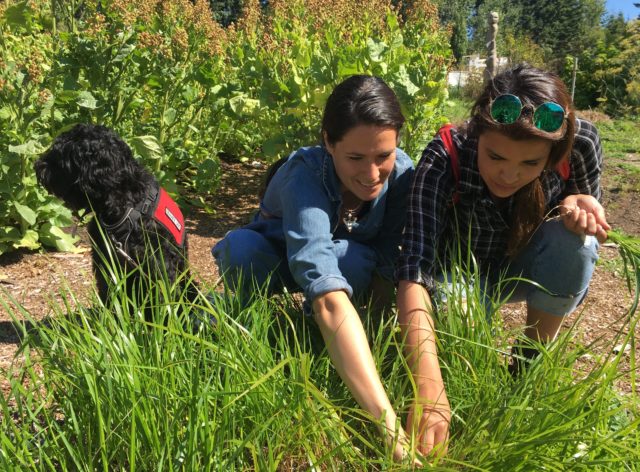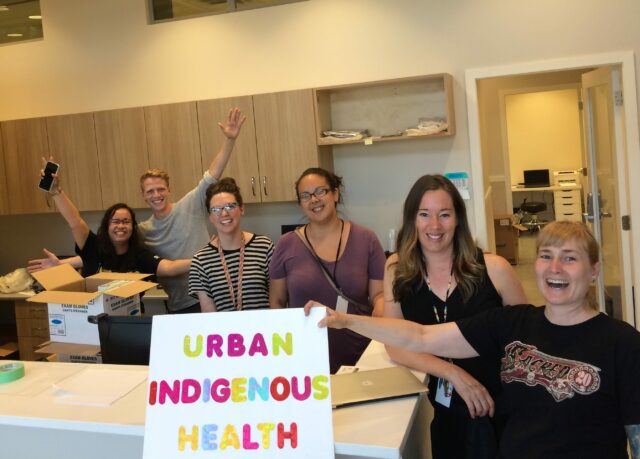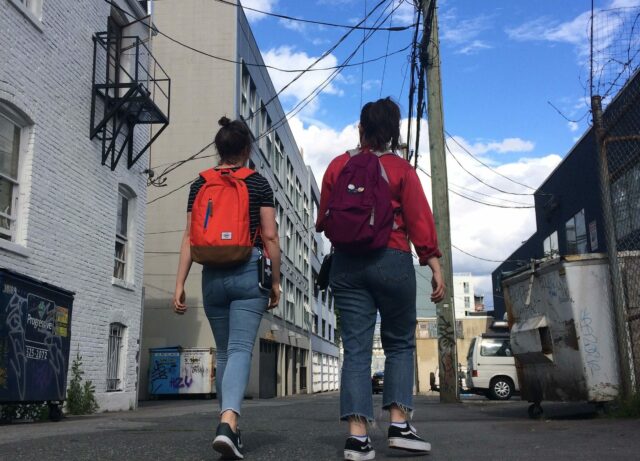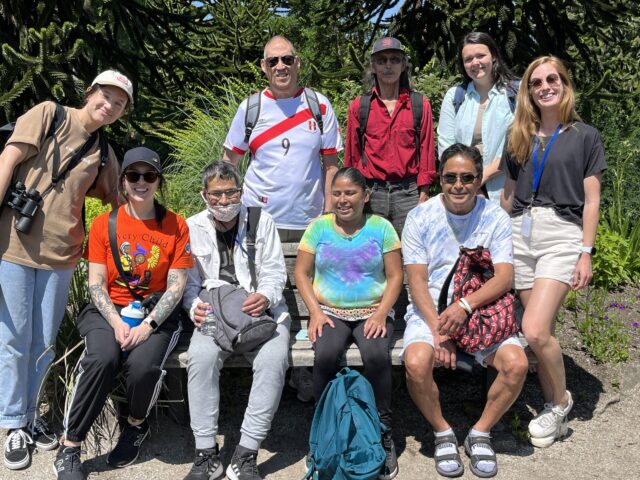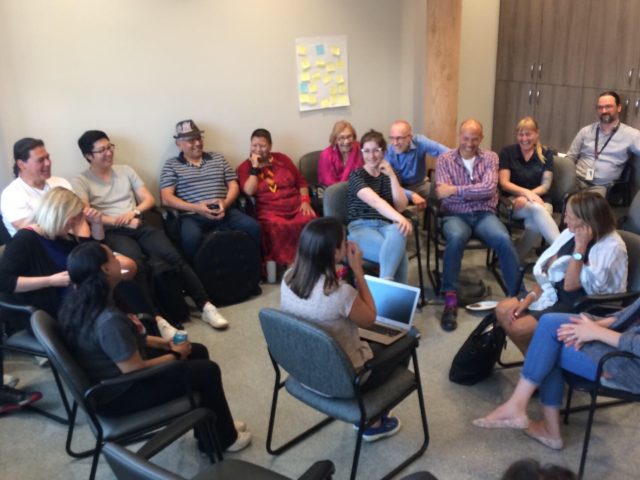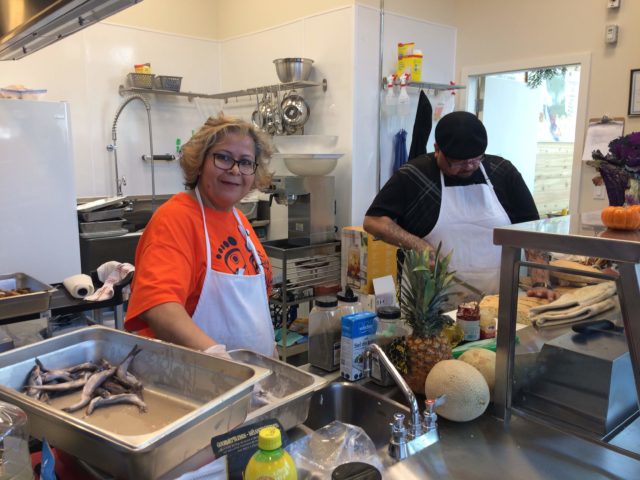Welcome
Kílala Lelum Health and Wellness Cooperative aims to partner Indigenous Elders with physicians and allied health professionals to provide physical, mental, emotional, and spiritual care to the community in Vancouver’s Downtown Eastside.
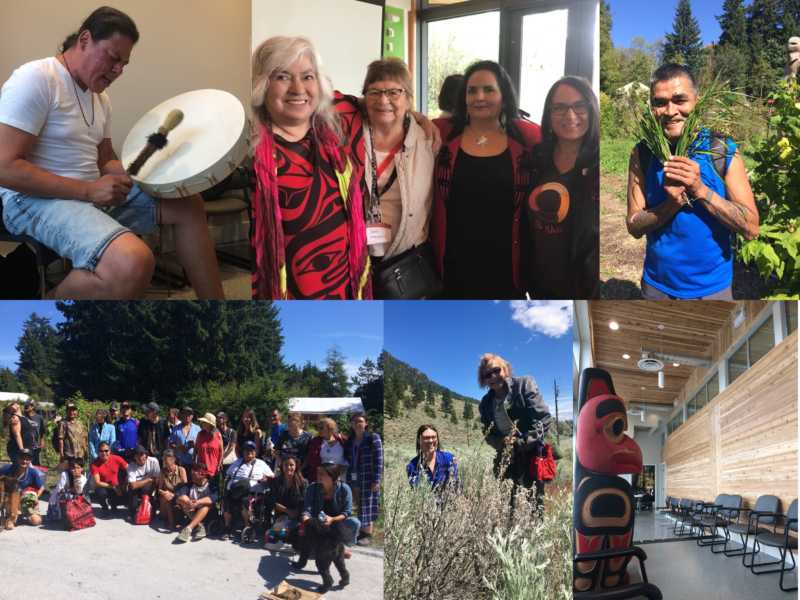
Kilala Lelum Frontline Staff Condemn the City of Vancouver's Police-Led Forced Displacement of DTES Residents from Hastings Street
Beginning on April 5 & 6, 2023, the Vancouver Police Department (VPD) led a large-scale, forced displacement operation planned by the City of Vancouver (CoV) to remove people and their belongings from East Hastings street. As a Downtown Eastside (DTES) Indigenous healthcare organization, Kílala Lelum stands against this show of force and blatant disregard for what we believe is the threshold for basic human rights.
Kílala Lelum frontline staff witnessed numerous instances of physical violence, arrests, unprovoked escalation, intimidation, and verbal abuse by police officers. At least one of our workers was shouted at by an officer for attempting to help a resident decamp in a safe way. We witnessed significant damage and theft of property, such as tents and personal belongings. For many of the impacted individuals, these were a majority of their belongings. Several of our staff witnessed police officers shamefully pushing Indigenous Elders while they engaged in ceremony in an offer of support for those experiencing displacement to nowhere. Kílala Lelum staff are committed to supporting our colleagues and service user membership who were impacted by this brutality.
We witnessed police dividing and separating community members who were on site to witness and protest these “evictions.” Police were restricting the movement of people trying to access their tents or belongings, and refusing to communicate with residents who had questions about their tents and belongings. This was the same for people trying to access their own housing and services in the areas blocked by the police.
We are in full agreement with the Downtown Eastside Women’s Centre (DEWC) and Battered Women’s Support Services (BWSS) press release outlining the unnecessary and amplified harm and trauma caused by the lack of advanced notice and communication of this operation. Executive Director of DEWC, Alice Kendall expressed: “Had we known about this in advance, we could have pointed out concerns and at the very least, planned to make sure the women were safe.” Instead, Kílala Lelum staff witnessed that when workers/volunteers/people attempted to help individuals decamp and remove their belongings, police interfered, shouted, and even physically pushed them back. While some people managed to negotiate ways to support, others were intimidated or forced away. Through this frightening and overwhelming process, many individuals lost their belongings completely. For their belongings, people were offered trash cans labeled ‘personal storage,’ which our staff were told could be accessed at Main & Hastings during working hours. The Vancouver Sun has since reported that the Aboriginal Front Door was not prepared for this influx, and many belongings have been sent to an undisclosed location.
As an organization, we echo the DTES Coalition’s (EIC, Urban Core, CCRN) recognition of the complexities of encampments, and that having individuals sleeping on city streets is not a goal to aspire to. As explained by the letter: “the solution to these concerns is a compassionate and holistic approach that prioritizes providing stable and appropriate housing to those in need and not forcibly displacing individuals to insufficient shelter.” While there are mixed accounts of whether limited/additional shelter beds were made available to individuals being displaced, this was not done in collaboration with service providers who have built relationships with and/or are community members. There remain widely acknowledged safety concerns with many of the ‘options’ available. Notably, our social navigation team was not made privy to the ‘available’ shelter units, and could not connect our members directly with these reported beds prior to the sweeps. As a clinic and a community, we have had members die while waiting on shelter and housing to become available over the last months and who were not part of the encampment. While these deaths may not be linked strictly to housing, we know adequate and dignified shelter plays a significant role in health outcomes–and all the daily struggles between life and death.
As noted by Pivot Legal Society: “there simply are not enough suitable shelter and housing options in Vancouver,” and therefore this latest “forced displacement simply recycles the familiar churn of homelessness, constantly circulating poverty and displacement in the DTES, without ever resolving the underlying conditions.” As an Indigenous organization, we echo the concern raised by Pivot, that these violent actions disproportionately impact Indigenous people, “who comprise 39% of Vancouver’s homeless population in the most recent point-in-time count.” Seeing this within the context of police brutality against Indigenous people highlights the operation as one more tangible example of systemic racism enacted by the CoV and VPD.
Kílala Lelum staff remain alarmed and appalled by the increased violence against DTES community members shared between the CoV, VPD and other complicit organizations and individuals. It is vital to see this operation in a historic context. These costly, publicly-funded decampments and street sweeps have occurred almost every year since 2014, causing significant harm and trauma to those impacted, and have no positive public health or public safety outcomes.
The continued use of violence, displacement, force and terror as a so-called public health and public safety strategy against our unhoused and drug-using community members is an abhorrent abuse of human rights. Harm is compounded when the CoV utilizes the VPD as a solution to the co-occurring housing and drug toxicity crises over providing safe and suitable housing, a safe drug supply, and robust community-led, socio-economic supports. While the events were shocking in scale, we affirm our community’s lived experiences; unhoused and drug-using community members interact with the heavy-handed, and at times deadly, state violence of the VPD on a daily basis. Kílala Lelum staff have gratitude for community-based groups, like ‘Defund604’ and ‘Distro Disco,’ who acted swiftly to provide material support for encampment residents with little institutional support.
Kílala Lelum strives to build safe and trusting relationships with all who we provide service to. We recognize that interlocking systems of power such as colonialism and capitalism are more often than not reproduced within other hierarchical systems, such as the healthcare system at large. As noted in the ‘In Plain Sight’ Report: Systemic Racism in B.C. Healthcare,” simply interacting with the healthcare system can be a health risk factor for communities who have been impacted by colonialism, poverty, and intergenerational trauma. Racism and biases against people who are unhoused and/or use substances, including those harboured by healthcare workers and the healthcare system itself, create situations where these individuals receive unsafe and harmful care.
Reflecting upon the role the VPD have played in historic and recent events, we urge all healthcare and social service delivery agencies, workers, and authorities to both unlearn their harmful biases towards Black and Indigenous peoples, people with disabilities, those living in poverty, without housing, and those who use drugs, and work toward untangling police presence and intervention from their care provision and service delivery on a daily basis.
Kilala Lelum’s Statement Re: The Tyee story “His Video Sparked a Probe into Police Misconduct. Then the Traffic Stops Started”
The Board of Directors, Executive Director, and entire clinical leadership team of Kílala Lelum Health Centre condemn the Vancouver Police Department (VPD) and RCMP’s treatment of Tyler Nielsen—a Métis outreach worker at our clinic.
Tyler is a valued part of our team and we share a consensus that he is very skilled and well-regarded by our membership and community within his role. Our team will provide support to Tyler in whichever steps come next.
Kílala Lelum is disappointed that the VPD has interfered with Tyler’s healthcare-oriented work. Our membership has high rates of negative experiences with law enforcement and systems of incarceration, and this policing pattern has the potential to act as a barrier for our staff/clinic’s ability to build therapeutic relationships in our community-based work. This pattern likewise has the potential to obstruct the ability of our membership to attend necessary, often critical, medical appointments in a timely fashion.
Kílala Lelum denounces all forms of police harassment and violence in the Downtown Eastside and beyond.
Signed,
Kilala Lelum Board of Directors
The Kilala Lelum Clinical and Executive Leadership Teams
Kilala Lelum’s Statement on Found Children at Kamloops Residential School
We honour and mourn the 215 children found at the Kamloops Indian Residential School:
The Kilala Lelum team expresses our deep sorrow for the 215 children found buried at the Kamloops Indian Residential School. We grieve for these children and their families, and for all of our Elders, members, staff, and community members. We grieve for those who have never stopped looking. We remember and grieve for the thousands more waiting to be found and also for those who are missing but will never be found.
We are all affected by this news and will continue to bear witness to the lived experience of residential school survivors and their families. We will continue to hold space for healing, supporting survivors and generations of youth who are and will continue to be impacted by this trauma. We bear witness to and continue to work against the dark, ongoing colonization of Indigenous people on this land.
We will work every day to decolonize ourselves, the systems we work within, and to advocate for justice for Indigenous people. We call on health care professionals and institutions to honour and hold space for Indigenous voices; to prioritize Indigenous voices now and in an ongoing way. We call on you to join us in doing the work of stepping up, educating ourselves on how we can work against state genocide, learning what the Truth and Reconciliation Calls to Action and the Report on Murdered and Missing Indigenous Women and Girls have to teach. We invite you to move with us through grief and into action. We invite you to honour your duty of care to help us all and to help Indigenous people, especially the youth, move from resiliency to softness, from survival to thrivance.
Support Resources:
The KUU-US Crisis Line Society: Operates a 24-hour provincial Indigenous Crisis Line for Adults and Elders at 250-723-4050; Children and Youth at 250-723-2040; Toll Free at 1-800-588-8717
First Nations and Inuit Hope for Wellness Help Line and Online Counselling Service: Toll free at 1-855-242-3310
Metis Crisis Line: Available 24 hours a day at 1-833-638-4722
Indian Residential School Survivors Society: 1-800-721-0066 or 604-985-4464 to access the following cultural supports: Sadie McPhee, Gertie Pierre, or Yvonne Rigby Jones. Emotional mental health and counselling services will be accessible for the IRSSS Resolution Health Support Workers.
Tsow Tun Le Lum: 1-888-403-3123 to access the following cultural supports: Levi Martin, James Quatell, Mike Kelly

